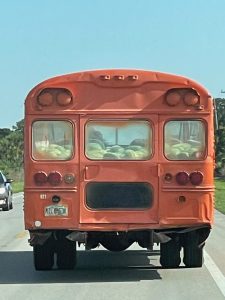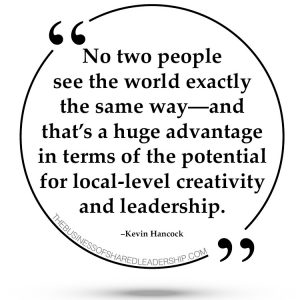“Everything you can imagine is real.”
—Pablo Picasso
 We were driving through rural, agricultural Florida just north of Lake Okeechobee when I saw it.
We were driving through rural, agricultural Florida just north of Lake Okeechobee when I saw it.
“What is that?” I said, removing my sunglasses for a second look.
Several vehicles ahead, on a four-way section of downtown road, was an old yellow school bus with the entire top cut off and the seats removed. Inside, filling the cavernous space, were watermelons . . . thousands of watermelons.
“Look! They’re off to watermelon school,” I said to my wife Alison. “It must be a private school. They’re all dressed alike.”
A couple of miles down the road I spotted another watermelon bus equally topless and fully loaded as a makeshift agricultural transport.
“Brilliant,” I said. “I want one.”
Alison was driving (as usual when we road-trip), so I pulled out my phone, went on eBay, and typed in school bus. Sure enough, I could buy one with the tap of a finger. There was a 2005 Thomas Freightliner for $1,625, and a 2007 Blue Bird 84-passenger with 226,104 miles, for $699.99.
As it turns out, there are lots of used school buses available. They’re cheap, and you can own one in minutes. Cutting the top off and growing enough watermelons to fill it however is a different matter.
* * *
 As we reached I-95 near Vero Beach, I still had watermelon buses on my mind. How utilitarian, creative, resourceful, and quintessentially American-free-enterprise they were. Some original, creative soul has taken something of no further value to its original owner (a retired school bus) and then reimagined its potential for a completely different industry.
As we reached I-95 near Vero Beach, I still had watermelon buses on my mind. How utilitarian, creative, resourceful, and quintessentially American-free-enterprise they were. Some original, creative soul has taken something of no further value to its original owner (a retired school bus) and then reimagined its potential for a completely different industry.
If someone had asked me yesterday what could be done with a used school bus, I certainly wouldn’t have come up with transporting watermelons as an option.
This is dispersed power in action. No two people see the world exactly the same way—and that’s a huge advantage in terms of the potential for local-level creativity and leadership.
From 1988 to 1991, right after graduating from college, I taught Russian and Soviet history at a prep school in Maine. Flashing back to that place and era, I imagined all the old Soviet school buses being sent to a central scrap heap for processing and disposal. No creative reimagining in that system! No watermelon buses, to be sure.
Today, in America, old buses end up on eBay where buyers and sellers make their own choices about current value and future use. Only in this kind of dispersed power system can you find such creativity, and as I browse once again I’m still super tempted to buy one.
What would I turn it into?
It all makes me think: What’s your watermelon bus? Where in your life have you taken something of little or no value to others and reimagined and repurposed it as something valuable just for you?
My voice disorder (spasmodic dysphonia) is a watermelon bus. On the surface it’s nothing more than a literal pain in the neck, which for a long time made the simple act of speaking a difficult chore. But then I reinvented and reimagined SD into something different, something valuable. My voice condition was a symbolic invitation to disperse power, share leadership, and strengthen the voices of others. It was an opportunity to decentralize power and advocate for a corporate values system in which everyone felt trusted, respected, valued, heard, and safe. I turned an incurable neurological disorder into a watermelon bus.
All of that was invented in my head and that alone made it real – gave it life.
You’ve done this, too; I’m sure of it!
Reflect for a moment on the literal and symbolic watermelon buses you’ve created in your life—the places and situations where you’ve found value when others saw none.
That’s self-awareness. That’s dispersed power. It’s what the Sioux call the Seventh Power, which is the innate ability of the individual human spirit to manifest the divine light that lives within us all.
Be thankful and proud of the watermelon buses you’ve created and give all those around you the space and trust to do the same.
“This is a hard truth for some to accept; that a lack of resources may not be their true constraint, just a lack of resourcefulness.”
—David Burkus
______
Thank you for considering my thoughts. In return I honor yours. Every voice matters. Nestled between our differences lies our future.
______
This is the fortieth post in a series of short essays to be posted by Kevin to www.thebusinessofsharedleadership.com in 2021. Kevin is dedicating these writings in honor of Black Elk, the Oglala Sioux holy man who was escorted as a child on a sacred vision quest by the 48 horses of the four directions to visit the six Grandfathers. My horses, prancing they are coming. They will dance; may you behold them. On that journey Black Elk understood the sacred power that dwelled within him and lives within us all. He also recognized that this power could be used for good or bad. Intentional we must be about the path we walk. To invite others to join The Business of Shared Leadership and receive these posts, just pass this link along. The more who join, the deeper the energy field of engagement will become! Thank you!